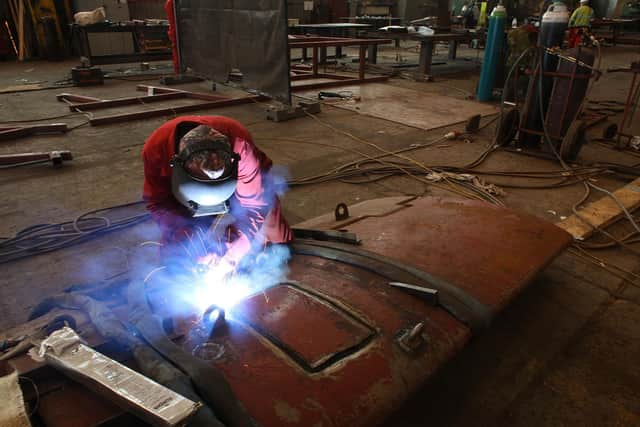Manufacturing PMI exceeds expectations - but amid accelerating costs
The sector outstripped expectations in the monthly IHS Markit/Chartered Institute of Procurement & Supply (Cips) purchasing managers' index (PMI) survey, which showed a reading of 60.4 last month, down from 63.9 in June.
The decrease comes on the back of record highs earlier this year as the economy pushed to leave the impact of the pandemic behind.
Advertisement
Hide AdAdvertisement
Hide AdDespite the fall, the July score is still evidence of high growth, and significantly ahead of the 57.1 reading that economists had expected for the month. Any score above 50 indicates growth.


Partly because of this continuing growth, the cost of materials has been soaring as demanded increases to match the necessary output. Problems in supply chains around the world have also put pressure on the price of many items.
Duncan Brock, group director at Cips, said: "Supply gridlock resulted in a moderate deceleration in the rates of expansion of production, new orders and job-creation.
"A mismatch in global recovery rates following the pandemic meant some businesses abandoned their usual suppliers to seek new sources and avoid elevated lead times and the shortages gripping the sector.
"Disruption is a worldwide problem however, so there was likely to be limited success in remodelling supply chains completely, with the challenges too difficult to circumnavigate."
Costs of everything from chemicals, commodities and cardboard to metals and food stuffs has driven up prices, which led to some of the highest rates of cost rises in the survey's history. Nearly three quarters of manufacturers reported that their costs were rising, and consequently manufacturers have started charging more for the products they are making.
IHS Markit director Rob Dobson said: "Amid growing indications that many supply chain disruptions and raw material shortages are unlikely to be fully resolved until 2022, the outlook remains one of constrained growth combined with high inflation for the foreseeable future."
Mike Thornton, partner and head of manufacturing at RSM, said the UK government “needs to act quickly and bring forward new rules for the fully vaccinated to test rather than self-isolate to keep production lines going and, in turn, support manufacturers to fuel the UK’s post-pandemic economic recovery”.
A message from the Editor:
Thank you for reading this article. We're more reliant on your support than ever as the shift in consumer habits brought about by coronavirus impacts our advertisers.
If you haven't already, please consider supporting our trusted, fact-checked journalism by taking out a digital subscription.
Comments
Want to join the conversation? Please or to comment on this article.
